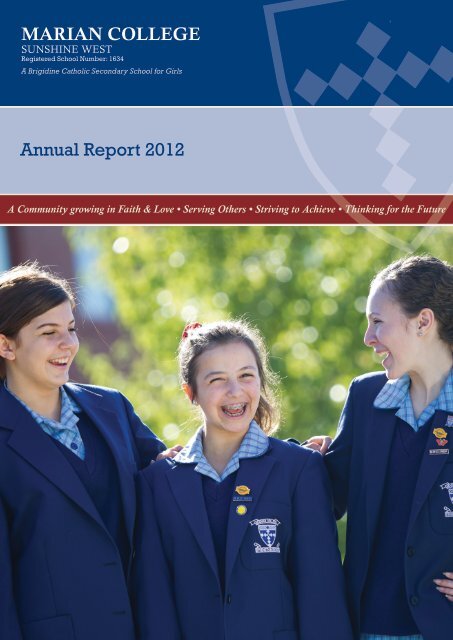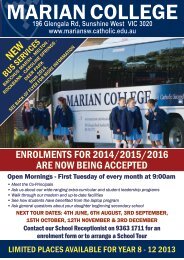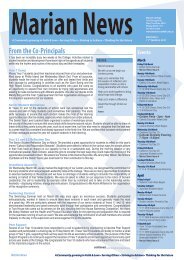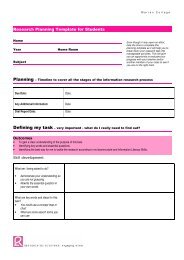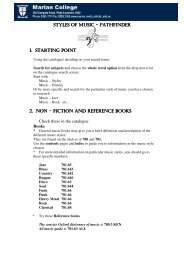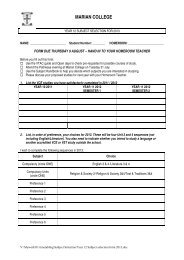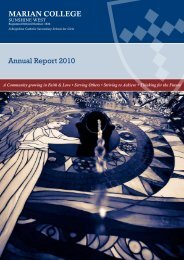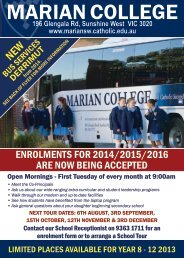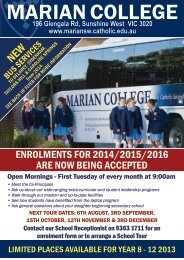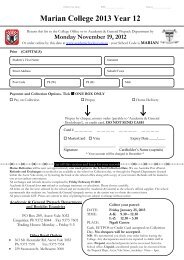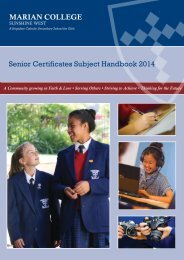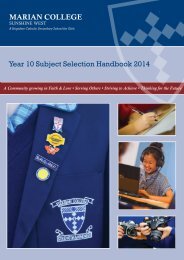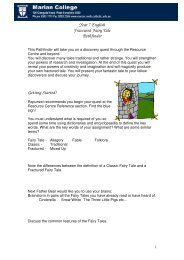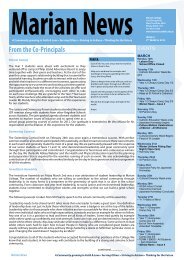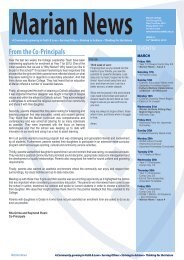Annual School Report 2012 - marian college
Annual School Report 2012 - marian college
Annual School Report 2012 - marian college
You also want an ePaper? Increase the reach of your titles
YUMPU automatically turns print PDFs into web optimized ePapers that Google loves.
MARIAN COLLEGE<br />
SUNSHINE WEST<br />
Registered <strong>School</strong> Number: 1634<br />
A Brigidine Catholic Secondary <strong>School</strong> for Girls<br />
<strong>Annual</strong> <strong>Report</strong> <strong>2012</strong><br />
A Community growing in Faith & Love • Serving Others • Striving to Achieve • Thinking for the Future
Marian College <strong>Annual</strong> <strong>Report</strong> <strong>2012</strong><br />
College<br />
Contact<br />
Information<br />
Address:<br />
196 Glengala Road, Sunshine West, 3020<br />
Co-Principals:<br />
Ms. Rita Grima<br />
Mr. Raymond Pisani<br />
Church Authority:<br />
Brigidine Congregation<br />
Telephone:<br />
(03) 9363 1711<br />
Email:<br />
principal@<strong>marian</strong>sw.catholic.edu.au<br />
Website:<br />
www.<strong>marian</strong>sw.catholic.edu.au<br />
Registered <strong>School</strong> Number: 1634<br />
A Community growing in Faith & Love • Serving Others • Striving to Achieve • Thinking for the Future<br />
2
Marian College <strong>Annual</strong> <strong>Report</strong> <strong>2012</strong><br />
Vision and<br />
Mission<br />
At Marian we take seriously our responsibility to provide<br />
the best learning environment for our students. This is best<br />
exemplified through our Vision Statement:<br />
Marian College:<br />
A Community growing in Faith and Love<br />
• Serving Others<br />
• Striving to Achieve<br />
• Thinking for the Future<br />
Our Mission statement also calls us to be true to our traditions, culture and future.<br />
Mission Statement:<br />
As our Community faithfully continues the journey of the Brigidine Sisters, immersed in the teachings of<br />
the Gospels and living the core values with strength and kindness, Marian College will:<br />
• Establish an environment that capitalises on our natural tendency for learning and use exemplary teaching practice<br />
so that all students can learn effectively and with a sense of purpose.<br />
• Respect and promote the uniqueness of each individual and provide opportunities for all to navigate their own path<br />
in life, realise their potential, and contribute to the growth of the community.<br />
• Celebrate effort and excellence, both personal and communal, in order to enhance the capacity for growth and<br />
learning.<br />
• Assert that justice requires a radical discomfort about the suffering of others and work to be an agent for change.<br />
• As a custodian of our Earth, confirm our faith in the future through careful stewardship that models and promotes<br />
a responsible and restrained use of resources.<br />
• Acknowledge our strengths and our common humanity by celebrating diversity.<br />
All our actions and activities over <strong>2012</strong> are evaluated through our Vision and Mission Statements.<br />
Moreover, all developments and changes are reflected in the Brigidine Core Values. All members of our<br />
school community have a responsibility to uphold the traditions on which this College has been established<br />
and the Core Values measure the integrity of all developments at Marian. The Brigidine tradition places<br />
great emphasis on protecting and valuing the dignity of each individual and hence, at Marian, we have<br />
the same outlook. We are here to serve the needs of all students in the most comprehensive and all<br />
inclusive manner.<br />
A Community growing in Faith & Love • Serving Others • Striving to Achieve • Thinking for the Future<br />
3
Marian College <strong>Annual</strong> <strong>Report</strong> <strong>2012</strong><br />
College<br />
Overview<br />
Our History<br />
Marian is a Catholic secondary school that has been providing<br />
education for girls in Year 7 to Year 12 since 1957. Our school is<br />
a congregational College under the stewardship of the Brigidine<br />
Sisters and a place where faith is proclaimed and celebrated.<br />
Our school motto, ‘Strength and Kindness,’ challenges students<br />
to show qualities of perseverance and energy, whilst at the same<br />
time, acting with gentleness.<br />
Marian College is a multi-cultural community that celebrates the strength which comes from diversity. The<br />
Brigidine Core Values, based on the gospel teachings of Jesus, inform our work in all areas of school life.<br />
All of our programs are provided within a very affordable fee structure, which is kept deliberately low to<br />
ensure families wishing to access a high quality, Catholic Education are able to do so within their local<br />
community. The College has embarked on a building program in keeping with a visionary master plan that<br />
provides for new or refurbished learning and teaching facilities well into the future.<br />
Curriculum<br />
The comprehensive curriculum offered from Years 7<br />
– 10 provides students with a broad knowledge base.<br />
In addition to literacy and numeracy programs the<br />
curriculum includes an instrumental music program for<br />
all Year 7 students, Year level camps for all students in<br />
Year 7 & 9 and a broad-ranging elective program in Years<br />
9 & 10. Comprehensive options at the Senior <strong>School</strong><br />
allow students to develop individualised VCE, VET and<br />
VCAL programs. The College has a strong commitment<br />
to digital technologies. From 2013 all students in Years<br />
7 – 12 will have a notebook laptop for their personal use<br />
and wide-spread access to technology is available across<br />
the school for all students.<br />
Co-Curricular<br />
An extensive co-curricular program offers choice for<br />
students to extend their learning in a variety of areas.<br />
Sport, Performing and Visual Arts programs sit alongside<br />
Social Justice programs, debating and public speaking<br />
teams, Science Club and LOTE Club. Students are<br />
encouraged to broaden their learning horizon through<br />
active participation in the Co-Curricular program.<br />
Healthy Bodies<br />
The development of an extensive Outdoor and Environmental Education Program at Years 10, 11 and 12 is<br />
supported by core Health and Physical Education classes in Years 7 to 10. The camping experience offered<br />
at Year 7 and Year 9 encourages young women to participate in a range of unfamiliar and challenging<br />
activities. Intra- and Inter-school sporting activities are a highlight of the sporting program.<br />
Community Engagement<br />
Students at Marian College are encouraged to contribute to community development within the school<br />
and in the broader community. Social Justice Groups are active and mirror the commitment to social<br />
action characteristic of the Brigidine Sisters. Students participate in nursing home visits, contribute to home<br />
work clubs and volunteer their time with soup vans. Student leaders contribute their voices to shaping the<br />
development of the College.<br />
Student Wellbeing<br />
Pastoral Care is the responsibility of each member of the school community. Students participate in a<br />
formal Pastoral Care program addressing the particular needs of the cohort and the year level. Strong<br />
transition processes support students new to the College at all year levels. A Peer Support program for<br />
Year 7 students builds connections with older students and is an opportunity for leadership development.<br />
Built on the Restorative Justice model, processes for student behaviour management provide for effective<br />
learning environments and focus on building positive relationships.<br />
A Community growing in Faith & Love • Serving Others • Striving to Achieve • Thinking for the Future<br />
4
Marian College <strong>Annual</strong> <strong>Report</strong> <strong>2012</strong><br />
Co-Principal’s<br />
<strong>Report</strong><br />
“You are the light of the world” – this was the theme,<br />
and the challenge, that was the focus point of our year,<br />
<strong>2012</strong>. There are many references to light in this context<br />
throughout the Old and New Testaments in the Bible.<br />
Some of these excerpts follow:<br />
Throughout <strong>2012</strong> members of the Marian College<br />
community accepted this invitation and have been<br />
the light of the world, in many cases, probably<br />
not realising the ways in which they were bringing<br />
the Gospel and Brigidine values to life and hence<br />
transforming the lives of those around them.<br />
A quick review of the school newsletters across <strong>2012</strong><br />
revealed several key themes:<br />
Matthew 5:14 “You are like light for the whole world. A city<br />
built on a hill cannot be hidden.”<br />
John 8:12 “I am the light of the world. Whoever follows me<br />
will have the light of life and will never walk in darkness.”<br />
Isaiah 49:6 “The Lord said to me ‘I will also make you a<br />
light to the nations – so that all the world may be saved’.”<br />
Acts 13:47 “I have made you a light for the nations, so that<br />
all the world may be saved.”<br />
What does it mean to be a light for the world? And<br />
what a responsibility it is to take on the saving of the<br />
world! The reference to light, as interpreted by biblical<br />
scholars, refers to God choosing to illuminate the<br />
minds of people, as the sun and moon enlighten the<br />
world. The disciples were those people on the Earth<br />
chosen to carry the spiritual light, spreading the light<br />
of the Gospel to the world, which was in darkness and<br />
ignorance, not having heard the words of Christ.<br />
So in our modern context we become light for the<br />
world by sharing and spreading the word of Christ<br />
in our world. This is not to be interpreted as simply<br />
reading and sharing the Gospels, although it’s a great<br />
place to start. It does mean however, taking seriously<br />
Christ’s challenge to us and living this out daily in our<br />
lives, especially in relationship with others. We become<br />
the light of the world, the beacon on the hill, the<br />
bearers of the message through what we say, how we<br />
act and who we are to the other.<br />
Encapsulated in this jumble of words is a spirit<br />
of participation, enthusiasm and generosity that<br />
characterises the Marian Community. And in that<br />
spirit is where we see the light for the world shining<br />
through. In the many small and myriad actions of<br />
individuals and groups we see teachers and students<br />
revealing the face of Christ to one another.<br />
Marian College is a place where students’ heads,<br />
hearts, hands and their entire way of being is engaged<br />
in the transformative work of realising God’s reign<br />
here on Earth. While we may not always name and<br />
recognise that this is what we are doing, the results of<br />
<strong>2012</strong> are a testament of our commitment to a vision of<br />
education that reflects the love, generosity and justice<br />
of the Gospels – our light to the world.<br />
In the Principal’s Address at the Opening <strong>School</strong><br />
Mass this was the invitation extended to the school<br />
community:<br />
So two incredibly wise men (Socrates and Jesus) who changed<br />
the course of history in their own ways have invited us to be<br />
the light of the world – perhaps what we can all do is to find<br />
at least one way that we can bring light to the lives of others<br />
– a friendly word, a welcoming smile, acknowledging the<br />
good that someone has done, contributing to something that is<br />
not all about me – you will think of many more. This is our<br />
mission as people of Faith to heed the call to live our lives to<br />
make a difference to the other.<br />
Raymond Pisani and Rita Grima - Co-Principals<br />
A Community growing in Faith & Love • Serving Others • Striving to Achieve • Thinking for the Future<br />
5
Marian College <strong>Annual</strong> <strong>Report</strong> <strong>2012</strong><br />
Church<br />
Authority<br />
Marian College is conducted by the Brigidine Sisters who have responsibility for seven Catholic secondary<br />
<strong>college</strong>s. As the authority in civil and canon law for Marian College, the Brigidine Sisters are active in<br />
the sponsorship and governance of the school. The Brigidine Sisters hold reserve powers that include<br />
appointment of Principals, a need for schools to seek approval for capital borrowings and a requirement<br />
for approval for significant change in educational direction. Such responsibilities are exercised through<br />
the promotion of a series of core values which state:<br />
In Brigidine Education we will:<br />
Be faithful<br />
to our Catholic heritage<br />
Welcome<br />
all people, especially the most vulnerable<br />
Celebrate<br />
all that is good with joy and gratitude<br />
Engender<br />
a love of learning, hope and<br />
a sense of purpose<br />
Image and practise<br />
justice and service<br />
This statement of core values informs policies and guidelines that are developed across each of the seven<br />
Brigidine secondary <strong>college</strong>s. In addition, the Brigidine Sisters promote a strong sense of networking<br />
between their schools through such means as the provision of professional development opportunities for<br />
staff, through regular meetings of their Principals and through active involvement in local Stewardship<br />
Councils.<br />
Brigidine schools are student focused. The Sisters are proud of the quality of teaching and learning<br />
programs in each of their schools, the focus that exists on student and staff wellbeing, and the careful<br />
stewarding of physical and financial resources that have been built up over many years.<br />
A Community growing in Faith & Love • Serving Others • Striving to Achieve • Thinking for the Future<br />
6
Marian College <strong>Annual</strong> <strong>Report</strong> <strong>2012</strong><br />
Stewardship<br />
Council<br />
The Marian Stewardship Council continues to review and<br />
reflect on the life of Marian College so that the College can<br />
remain strong in providing quality education for all students.<br />
Soundly led by Ray Pisani and Rita Grima, Marian is enriched<br />
by a very dedicated and inspirational team who actively work<br />
to engage the students in valuable learning experiences. Once<br />
again I sincerely thank Rita and Ray for their enthusiasm,<br />
excellent leadership and their unique commitment to the<br />
Marian Community.<br />
The <strong>School</strong> <strong>Annual</strong> Action Plan (AAP) developed by staff, provided the Stewardship Council with<br />
detailed information about the directions of the school for <strong>2012</strong>. Over a number of meetings we were<br />
privileged to hear from a variety of staff about their work in implementing this year’s plan.<br />
• Education in Faith<br />
Discussion and input lead by Dianne Reynolds and Daniel Mogg<br />
• Providing for Student Needs<br />
Discussion and input lead by Alison Roberts<br />
• Leadership: Performance and Development Culture<br />
Discussion and input lead by Donna Rampova<br />
All of these key discussions allowed us an opportunity to hear about what was happening at Marian but<br />
also provided us opportunity, as critical friends, to contribute ideas and raise questions about the Catholic<br />
ethos and Brigidine traditions that underpin our school.<br />
Our contributions to the management of school resources is achieved through our work at the committee<br />
level where the Resources team (Michael Baddeley, Leanne Di Stefano, Yolanda Palacios, Alison Roberts,<br />
Rita, Ray and myself) meet regularly to discuss and monitor the school budget and facilities development.<br />
This year the whole Stewardship Council were involved in a presentation of the <strong>School</strong> Master Plan by<br />
MINX Architects. The implementation of these designs over the coming years will provide outstanding<br />
facilities for the education of our girls.<br />
A key discussion during the year focused on the review of 2011 VCE Results. The success of all students<br />
was particularly evident in the data that was presented. It was obvious that much work had gone into<br />
identifying student needs and strengths so that their future directions were well planned for.<br />
In the final term for <strong>2012</strong> we continued to explore aspects of school life that lead to the enrichment of all<br />
that happens at Marian. Marian is a unique school and proudly provides a distinctive education for all<br />
students. Congratulations to all members of the Marian community on another fine year together.<br />
Annette Broadfoot<br />
Chairperson Stewardship Council<br />
A Community growing in Faith & Love • Serving Others • Striving to Achieve • Thinking for the Future<br />
7
Marian College <strong>Annual</strong> <strong>Report</strong> <strong>2012</strong><br />
Education<br />
in Faith<br />
Theme for <strong>2012</strong><br />
We are all called to live lives modeled on the values of love,<br />
justice, compassion and service; in doing so we bring about<br />
God’s reign, in the here and now, on earth. The theme in<br />
<strong>2012</strong>, ‘You are the Light of the World’, reminds us that we are<br />
called to be followers of Christ in our relationships with each<br />
other and the entire created world. The Brigidine value that we<br />
emphasised over the year was ‘Celebrate all that is good with<br />
joy and gratitude.’ This was chosen because the Catholic Church celebrated fifty years since the beginning<br />
of Vatican II and their theme ‘Open the doors and let the Light in’.<br />
Liturgies<br />
The liturgies over <strong>2012</strong> have focused on our mission to be Christ like in all that we do. We are challenged<br />
to be inclusive in our relationships with those in our community and beyond. Over the year we have had<br />
two whole school Masses. The opening of the school year Mass was celebrated by our school chaplain, Fr<br />
Mauel Sunez. The reading were taken from the Gospel of Mark; the calling of the Disciples. Fr Manuel,<br />
in his homily, spoke about what is to be a disciple and the challenge that we are called to. The other whole<br />
school mass was Brigidine Day, celebrated by Fr Barry Hughes. The theme was “You are the light of the<br />
World” and the readings focused on our mission. We were grateful to Tom Purcell for the reflection on the<br />
readings, where he spoke about his understanding of Corinthians 7:29-31, ‘the world as we know it will<br />
pass away’ giving rise to a new world where there will be justice for all. This reading linked to the Gospel<br />
reading the ‘Call of the disciples’, by which we are challenged to work with others to bring about change.<br />
During Lent, at the whole school Assembly we enacted John’s account of the foot-washing. The Co-<br />
Principals washed the feet of the SRCs and two staff members as an act of service. Within Religious<br />
Education classes students had the opportunity to reflect on Lenten themes with prepared liturgies in the<br />
Prayer Room. Throughout the year we had level Masses for students, where they have selected Scripture<br />
readings and written prayers of Intercession and representatives from the level have read.<br />
Reflection Days<br />
The Senior Reflection Days gave students and mentor teachers an opportunity to build relationship within<br />
mentor groups. For the first time we had an overnight stay for our year 12 students in which they further<br />
developed their understanding of themselves through a hands on activity with photos of themselves and<br />
significant events in their lives. The two days concluded with a memorable liturgy entitled ‘you raise me<br />
up.’<br />
Our year 7 students’ Reflection Day was all about transition from many different primary schools to a<br />
combined group at Marian College. The year 7 area was decorated with reminders of the day, with their<br />
hopes and goals and a photo of themselves attached to a large tree, taking up much of the wall around the<br />
stair well. Year 8 students celebrated their Reflection Day in August and the theme focused on friendship<br />
and extending it beyond themselves. Sr Martin Jones was a guest speaker and told stories of her life as a<br />
Brigidine and how her vocation has supported her in befriending many people, especially those in most<br />
need of friendship, the refugees. The Year 9 students’ theme was ‘Paying it Forward’, where the day focused<br />
on raising awareness of other’s needs. Students listened to speakers and then organised activities that<br />
enabled them to do some good for families and others outside of those they usually associated with. Year<br />
10 students’ Reflection Day was an extension of what they have been learning in the Religious Education<br />
classes on Catholic Social Teaching. They went to Werribee Mansion for the day. Within each of the<br />
Reflection Days students have time to reflect on their spirituality and have opportunities for prayer and<br />
reflection in a liturgy.<br />
A Community growing in Faith & Love • Serving Others • Striving to Achieve • Thinking for the Future<br />
8
Marian College <strong>Annual</strong> <strong>Report</strong> <strong>2012</strong><br />
Education<br />
in Faith<br />
(continued)<br />
The staff Reflection Day, held in May, was facilitated by Fr Richard<br />
Leonard SJ and stirred many emotions as we considered what it<br />
is to be Catholic educators and how we are called upon to live out<br />
our faith - to speak and live out the Good News. Richard helped us<br />
negotiate this challenge through his life experiences, his humour and<br />
his expertise through working in the media. It was a very thought<br />
provoking day that enabled staff to think about their lives and<br />
spirituality and how we are able to connect in our relationships with<br />
others and in particular our students.<br />
The College wishes to thank Year Level Leaders, Homeroom/Mentor teachers, the Liturgy Group, Choir and Gospel<br />
singers for all the support they have given to make this an exceptional year, where staff had time to attend to their<br />
personal spirituality in Reflection Days and Liturgies. May they be blessed in their lives.<br />
Religious Education<br />
The teaching and learning of Religious Education at Marian is lived through our Vision:<br />
As a Brigidine school in the 21st Century, our challenge<br />
is to make Religious Education relevant and meaningful<br />
to all in our Marian College community. We want our<br />
students to action their faith – not just talk about it.<br />
In <strong>2012</strong>, we have challenged the Marian students to live<br />
out Catholic Social Teaching in a variety of ways.<br />
Year 7 – Students were welcomed into Marian College<br />
with an introduction and enculturation into the life of<br />
Saint Brigid and Daniel Delany – significant people in<br />
the history of the Brigidine Sisters. We hope our Year<br />
7 girls can learn from Brigid & Daniel by taking their<br />
example of service to the wider community.<br />
A community growing in faith & love,<br />
Serving others,<br />
Striving to achieve,<br />
Thinking for our future<br />
Year 8 – Studied the importance of developing relationship the qualities of successful relationships. Girls also studied<br />
their role as environmental stewards of our planet.<br />
Year 9 – Bible studies were a focus in year 9 where the girls researched Old Testament Prophets and looked at the<br />
qualities they share with contemporary prophets. We studied the concept of Good Versus Evil and the History of<br />
the Catholic Church in Australia.<br />
Year 10 – During the first semester, our Year 10 girls studied Relationships, Commitment & Moral Responsibility.<br />
In second semester, we studied Social Justice focusing on Catholic Social Teachings and the Declaration of Human<br />
Rights. This was followed up by 6 weeks of community service where girls were provided the opportunity to put into<br />
practice their learnings.<br />
Year 11 & 12 – Students have been great leaders in Religious Education throughout <strong>2012</strong>. Many have also been<br />
active participants in co-curricular groups such as JDF, Vinnies, Leo’s and Liturgy.<br />
A Community growing in Faith & Love • Serving Others • Striving to Achieve • Thinking for the Future<br />
9
Marian College <strong>Annual</strong> <strong>Report</strong> <strong>2012</strong><br />
Value<br />
Added<br />
In summary, there are many activities and programs that are<br />
organised at Marian College that have a positive effect on the<br />
wellbeing and achievements of students and the school community.<br />
The following list demonstrates the many varied and rich curricular<br />
and extra-curricular activities that occur at the school. These<br />
include:<br />
• College Liturgies, Retreats, Prayer Services.<br />
• Homework Club.<br />
• Pastoral Care Programs – Beaut Buddies, Peer<br />
Support, social skills.<br />
• Open Day.<br />
• The Justice and Democracy Forum, The Leos Club,<br />
St. Vincent De Paul Group.<br />
• Design Education Exhibition.<br />
• <strong>School</strong> Camps, Excursions.<br />
• LOTE Week, Science Week, Book Week<br />
• Cultural Diversity Week<br />
• Japanese Cultural Exchange.<br />
• Year 10 Social, Year 12 Graduation.<br />
• Indigenous Experience - Central Australia Trip<br />
• Awards Night<br />
• College Assemblies<br />
• Student and Family Wellbeing Support, 1.4 FTE<br />
Counsellors.<br />
• Interschool Sport, Interhouse Sports,<br />
• Sudanese Family Support, Vietnamese Family<br />
Support.<br />
• Music Programs, <strong>School</strong> Rock Band, <strong>School</strong> Choir,<br />
College Music Nights, Brigidine Choral Fest.<br />
• Work Experience Program.<br />
• Special Interest Clubs eg Science Club, Environmental<br />
Club, Art Club<br />
• Brigidine Celebration Day combined with Make A<br />
Difference Day.<br />
• Use of Information and Communication Technology.<br />
• Student Leadership Programs.<br />
• Work Experience Program.<br />
• Transition Process<br />
• Guest Speakers.<br />
A Community growing in Faith & Love • Serving Others • Striving to Achieve • Thinking for the Future<br />
10
Marian College <strong>Annual</strong> <strong>Report</strong> <strong>2012</strong><br />
Professional<br />
Engagement<br />
The Melbourne Declaration on Educational Goals for Young<br />
Australians sets the ambitious goal of young Australians<br />
becoming successful learners, confident and creative individuals<br />
and active and informed citizens. In order to achieve this,<br />
research has emphasised the importance of effective professional<br />
learning in order to improve student outcomes. Professional<br />
Learning at Marian College has been characterised by relevant<br />
team projects, collaboration promoted by active involvement in the design, practice and the evaluation of<br />
the learning to improve the effectiveness of teacher pedagogy. The Professional Action Learning Teams<br />
(PALTs) have been an example of this type of learning at the College.<br />
In <strong>2012</strong> we continued our work with the PALTs. These teams are established to provide a framework<br />
for teachers to work on targeted projects to improve the teaching and learning outcomes for all students<br />
and continue the professional dialogue between staff about pedagogy. Our teams were supported in their<br />
actions by their respective Curriculum Leaders and the framework established the opportunity for all staff<br />
to take part in team teaching and or classroom observations. Staff used data, which included student and<br />
teacher surveys, sample student work and the opportunity for peer feedback to evaluate the units being<br />
delivered and work towards improved pedagogical practices.<br />
We began <strong>2012</strong> with our curriculum day focussing on the National Curriculum and in particular Education<br />
for Sustainability, focussing on four areas: water, waste, biodiversity and energy. Term Two saw the focus<br />
shift to professional learning in support of our students in the portfolio process. This meant that all staff<br />
undertook sessions in any combination of the following: PowerPoint Kiosk, Movie Maker and Blogging.<br />
These sessions supported both staff and students effectively throughout the year. Team planning within<br />
Domain areas has also be the main focus of our professional learning days and as always priority was<br />
given to specific OHS training undertaken by appropriate staff, namely the anaphylaxis briefing, Warden<br />
Session, First Aid and CPR Updates.<br />
Over the year we had fifteen staff who took part in the appraisal process. This framework provided teaching<br />
staff with an opportunity to evaluate their performance in the classroom by using data to identify areas<br />
of strength and areas for further improvement and consolidation. This appraisal system provided school<br />
leadership with the opportunity to affirm and acknowledge good practice and to work collaboratively with<br />
individuals to develop their Professional Learning Plans.<br />
Term three saw staff involved in the <strong>Annual</strong> Seminar Day which was held at Ascot House Receptions.<br />
Teaching staff took part in a day focussing on differentiating the curriculum and were given the ‘tools’<br />
necessary to work on a series of lessons or tasks to bring back to their classrooms. Our support staff spent<br />
the day working with Danielle Peters from Total Workplace Solutions. Danielle focussed on the concepts of<br />
‘choosing your attitude and how an individual’s mind set can impact upon the workplace environment’.<br />
Over the past 18 months a small group of staff have been busy working on a Middle Leadership Appraisal<br />
Process. This framework will work to build the capacity of our <strong>School</strong> Leaders and to shape our College<br />
as a learning organisation where professional learning and personal development are embedded in our<br />
school culture and where improvement is continuously sought. This process was trialled in Term Four by a<br />
volunteer group of leaders with the view to evaluate and implement the process fully in 2013.<br />
A Community growing in Faith & Love • Serving Others • Striving to Achieve • Thinking for the Future<br />
11
Marian College <strong>Annual</strong> <strong>Report</strong> <strong>2012</strong><br />
Professional<br />
Engagement<br />
(continued)<br />
Staff Attendance<br />
The figures represent the average percentage attendance rate<br />
per staff member who was employed at the school on the last<br />
day of term 4. Staff on any type of leave during the year have<br />
been counted as not being in attendance during that leave.<br />
This includes staff on long service leave, leave without pay and<br />
maternity leave.<br />
The average attendance rate for teaching staff 88.45%<br />
The average attendance rate for non-teaching staff 91.12%<br />
The average attendance rate for all staff 89.5%<br />
The Marian College staff are to be congratulated for their commitment to providing a Learning and<br />
Teaching program that is comprehensive and caters for the many individual needs of our students. All<br />
staff have been involved in organising and participating in a myriad of academic, cultural, sporting and<br />
wellbeing activities. The staff commit their time and effort to the overall development of each student and<br />
work in partnership with the College community to provide future pathways for all.<br />
Staff Retention<br />
The proportion of teaching staff retained in <strong>2012</strong> from the previous year was 89.55%. It should be noted<br />
that the calculation of this figure is affected by staff not retained as they had been employed to take<br />
the place of teachers who would be returning to teaching duties the next year. The College continues<br />
to recognise the dedicated service of staff and in <strong>2012</strong> we honoured two staff members who celebrated<br />
30 years service, one staff member who celebrated 25 years service, 3 staff members who celebrated 20<br />
years service, 5 staff members who celebrated 15 years service and three staff members who celebrated<br />
10 years service. Teachers and ancillary staff transfer from school to school for a variety of reasons both<br />
professional and personal. All staff at the College should be endeavouring to further themselves in their<br />
own career path. The College realises that staff may leave to enhance their own prospects for promotion.<br />
Similarly, the College seeks to employ new staff who will add particular expertise, creativity in a preferred<br />
area or overall educational leadership.<br />
Teacher Qualifications<br />
Marian College is proud to acknowledge the diversity amongst the teaching staff and their commitment to<br />
lifelong learning. Our staff members have attained a variety of qualifications and this assists us to deliver<br />
specific programs for our students. The following table and graph describes the aggregate qualifications for<br />
the staff employed at Marian College as compared to all schools in Victoria.<br />
Level<br />
This Like All<br />
<strong>School</strong> <strong>School</strong>s <strong>School</strong>s<br />
Degree - Doctorate 0% 0.99% 0.84%<br />
Degree - Masters 18.84% 13.52% 14.44%<br />
Diploma - Graduate 36.23% 43.95% 43.24%<br />
Certificate - Graduate 2.9% 6.41% 5.79%<br />
Degree - Bachelor 82.61% 80.41% 79.4%<br />
Diploma - Advanced 27.54% 25.42% 23.38%<br />
No Qualifications Listed 4.35% 8.1% 10.61%<br />
A Community growing in Faith & Love • Serving Others • Striving to Achieve • Thinking for the Future<br />
12
Marian College <strong>Annual</strong> <strong>Report</strong> <strong>2012</strong><br />
Professional<br />
Engagement<br />
(continued)<br />
Staff Composition<br />
The following table illustrates the composition of the teaching<br />
and non-teaching staff at Marian College over <strong>2012</strong>. The College<br />
provides employment for a wide range of roles, skills and talents<br />
as seen by the number of full-time equivalent staff.<br />
Principal class 2<br />
Teaching staff (head count) 64<br />
FTE teaching staff 56.22<br />
Non-teaching staff (head count) 37<br />
FTE non-teaching staff 26.86<br />
Indigenous teaching staff 0<br />
Expenditure and Teacher Participation in Professional Learning<br />
Professional Learning is an important ingredient in overall school improvement and all staff are expected<br />
to model the Brigidine Core Value of a ‘love of learning.’ The College supports staff involvement in<br />
professional learning experiences and staff members have many opportunities to participate in teaching<br />
pedagogy. Consequently staff members at Marian are committed to the growth of their own professional<br />
knowledge and practice and they take part in formal and informal activities that strengthen the learning<br />
and teaching capacity at the school. At Marian we acknowledge that all who are employed by the school<br />
share in the duty of educating our students. Consequently, in <strong>2012</strong>, opportunities were offered to all staff to<br />
participate in professional development. In total, approximately $158,547 was committed to professional<br />
learning, shared between 99 staff members, resulting in an average spending of $1601 per staff member.<br />
Some of the major areas that were targeted for professional learning included:<br />
Leadership<br />
Girls in Education, Performance and Development Culture <strong>2012</strong>, The Brigidine Sisters launch of Kildare<br />
Ministries.<br />
Australian Curriculum<br />
Australian Curriculum –Mathematics, Delivering better results for the Australian Curriculum: Mathematics,<br />
Leading the Implementation of the Australian Curriculum – Secondary, Managing Transition to the<br />
Australian Curriculum<br />
Careers<br />
Career Practitioner’s Day Melbourne University, Careers Network Meeting, Career’s Practioner’s Day<br />
ACU. Pathways & Transition Program, RMIT Careers Day<br />
Assessment<br />
NAPLAN NSW Expert Markers Validity Marking, NAPLAN Training and Assessment, NAPLAN<br />
Workshop, VCAA Scored Assessment VET/VCE, VCE Exam Conduct and Administration for ongoing<br />
Chief Supervisors, VTAC Briefing, VATE Meet the assessors<br />
A Community growing in Faith & Love • Serving Others • Striving to Achieve • Thinking for the Future<br />
13
Marian College <strong>Annual</strong> <strong>Report</strong> <strong>2012</strong><br />
Professional<br />
Engagement<br />
(continued)<br />
Religious Education<br />
Authentic and Sustainable Contemporary Spiritual Formation,<br />
Brigidine JDF Co-ordinators, Celebrate Often and Celebrate<br />
Well, How can Catholic <strong>School</strong>s form Believers in a Media<br />
Saturated Culture, iGod - Technology and Religious Education,<br />
Is RE about what I teach or who I teach? (or both?), Meditation:<br />
Whole <strong>School</strong> Experience, RE-contextualising Catholic<br />
Identity, Religious Education Conference <strong>2012</strong>, Retreat Day<br />
for Secondary RECs and FDCs, Rich and Relevant Religious Education: Secondary, Teachers New to<br />
Brigidine Education<br />
Wellbeing<br />
Alcohol and Other Drugs: What are young people up to? Amazing Audacity, Applied Suicide Intervention<br />
Skill Training, Fighting Fair -Meditation and Conflict Resolution Course, Introduction to Restorative<br />
Practice, Rock and Water Program Focus on Girls, <strong>School</strong> Refusal in Children and Adolescents, Self<br />
Harm: Understanding and Helping Young People, Student Wellbeing (CECV), What’s happening to our<br />
girls? Year Level Leaders’ Formation Day.<br />
Learning and Teaching<br />
Surviving and Thriving In the First Years of Teaching, Engage and motivate students, Habits of Mind<br />
-Practical Classroom Strategy, Ronald McDonald Learning Program PD for Teachers, Thriving in a<br />
mixed ability classroom by differentiating the curriculum, ACER <strong>Annual</strong> Conference, Curriculum Leaders<br />
Formation Day, How to motivate, manage and engage your students, LNSLN Online 2013 briefing session,<br />
Northern/Western Secondary Student Support Coordinators PLC, Teaching and Supporting Students<br />
with Special Needs.<br />
Subject Related Professional Learning<br />
Art, Literature and Stories -SLAV Conference, Design and Technology Teachers Association, Food for<br />
the Journey: Hints on how to integrate visual images, Lino Printing using a Press, Melbourne Art Fair<br />
<strong>2012</strong>, National Visual Arts Education Conference, VCV Conference, Writing for VCE Art and Studio<br />
Arts, Practical Comprehension Strategies for the ESL/EAL Learner, Seven Steps to Writing Success,<br />
VATE Meet the assessors, VCE English and ESL: An overview of Unit 3and 4 curriculum, texts, VCE<br />
Literature, International Federation of Home Economics, Kitchen Assistant Conference, Global Politics<br />
-The New Study Design, Law <strong>School</strong>, VCE Global Politics, VCE UNIT 1 History Conference, VATI<br />
Congress <strong>2012</strong>, Effective Teaching of Maths at Years 9 and 10, Mathematics Leadership, Mathematics<br />
Regional Leadership Cluster Secondary, MAV VCE SAC Evening- Maths Methods, AMUSE VCE Music<br />
Conference, PEAK PHYS ED- “Victorian Health Collaboration Conference,” <strong>2012</strong> VCE Sciences and<br />
Accounting Information briefing, Teaching the revised VCE Chemistry Course.<br />
ICT<br />
A teachers guide to effectively using technology in the classroom, E-Literacy think differently, learn<br />
differently, Integrating iPads into the music classroom.<br />
Work, Health and Safety<br />
OHS for <strong>School</strong> Leaders, Emergency Management Procedures, First Aid, Anaphylaxis<br />
A Community growing in Faith & Love • Serving Others • Striving to Achieve • Thinking for the Future<br />
14
Marian College <strong>Annual</strong> <strong>Report</strong> <strong>2012</strong><br />
Student<br />
Outcomes<br />
In late 2006 the results of a review into teaching and learning<br />
were presented to the Government in England. The research<br />
group was asked to establish a clear vision for what personalised<br />
teaching and learning might look like in schools in the year<br />
2020. Whilst Australia is some 17,000 kilometres away, the<br />
common denominator here is that we all teach mixed ability<br />
students and want the best opportunities and outcomes for this<br />
and the next generation.<br />
The research identified what the review group believed to be the foundation of a successful education<br />
system in the 21st century; that is an approach to personalised learning.<br />
A quote from the report:<br />
Personalising learning means, in practical terms, focusing in a more structured way on each child’s learning in order to<br />
enhance progress, achievement and participation. All children and young people have the right to receive support and<br />
challenge, tailored to their needs, interests and abilities. This demands active commitment from pupils, responsiveness<br />
from teachers and engagement from parents.<br />
Put simply, personalising learning and teaching means taking a highly structured and responsible approach to each<br />
child’s learning, in order that all are able to progress, achieve and participate. It means strengthening the link between<br />
learning and teaching by engaging pupils – and their parents, as partners in learning.<br />
A Vision for Teaching and Learning in 2020 produced by the Department of Education and Skills -<br />
2006<br />
We are almost half way towards 2020 from when the report was published and we are pleased with the<br />
direction Marian College has taken, through a variety of channels, to being well on its way to improving<br />
student outcomes by the personal approach it has always taken to learning.<br />
This means the curriculum that is delivered provides students with the opportunity to enter and exit at<br />
a level that suits their individual learning styles, ability and interests. In <strong>2012</strong> the College has invested<br />
a considerable amount of time in providing skills to teachers that allow them to modify the learning to<br />
cater for all ends of the educational spectrum. Each classroom provides a challenging and stimulating<br />
environment for all students to be successful in their learning and therefore caters to the individual needs<br />
of the student.<br />
The College has also continued its work to have a greater understanding of how students learn. This<br />
means that teachers use their skills and knowledge to engage students in a partnership role that facilitates<br />
creative thinking and taking safe risks to manage change. The introduction of laptops to all students in<br />
Years 7 to 11 has proven successful in opening the world of learning with a few taps of the keyboard.<br />
The plethora of subject-specific software has made learning relevant and accessible as well as enhancing<br />
creativity skills.<br />
At Marian we are always looking for ways to improve the capacity for parents to be partners in their<br />
daughter’s learning. This year, we have encouraged parents to be more involved in the College through<br />
specific parent information evenings and providing study guides to parents whose daughters are in their<br />
senior years of schooling. Parents now have a better understanding of the rigor required in Years 11 and<br />
12 and can help support their daughter during the peaks and troughs of the school year.<br />
A Community growing in Faith & Love • Serving Others • Striving to Achieve • Thinking for the Future<br />
15
Marian College <strong>Annual</strong> <strong>Report</strong> <strong>2012</strong><br />
Student<br />
Outcomes<br />
(continued)<br />
Finally, the students need to see value in what they are doing. Ongoing<br />
review and evaluation of the curriculum at Marian College<br />
is a vital step in maintaining interest and relevancy. A professional<br />
learning community is embedded in the culture at Marian where<br />
teachers work collaboratively to develop units of work that have an<br />
inquiry approach. This means that we are setting tasks that enable<br />
students to think beyond a search engine. In other words, they are<br />
not going to find the answer in one or two locations but rather draw<br />
together a range of resources and discern the information themselves<br />
in order to reach a conclusion.<br />
All of this work is ongoing and we are travelling this journey<br />
together. We still have much to do at Marian College and we take<br />
this opportunity to thank a special group of people for getting us<br />
to where we are today. The College’s Teaching and Learning team work collectively to make major decisions<br />
regarding the curriculum direction – we thank them for the robust conversations we have on a regular basis<br />
working towards the common goal of improvement. They have demonstrated adaptability when it comes to<br />
change and flexibility when things don’t always go to plan. Marian College is truly a vibrant community of<br />
learning.<br />
Student Attendance<br />
Attendance at school is an important determinant in the progress of any student. As well as developing<br />
learning strategies, attendance helps children to develop social skills such as friendship building, teamwork,<br />
communication skills and healthy self esteem. By regularly missing days of school, students are at risk of<br />
missing out on key learning activities and may experience long term difficulties with their learning. Student<br />
attendance for <strong>2012</strong> at Marian College is indicated in the table below.<br />
Average student<br />
attendance rate<br />
by year level<br />
Year 7 95.69%<br />
Year 8 94.96%<br />
Year 9 94.91%<br />
Year 10 95.08%<br />
Overall average attendance 95.16%<br />
The College has introduced procedures to promote the need to attend all school days especially at the senior<br />
level. An electronic monitoring process, immediate contact with parents and formal documented procedures at<br />
VCE have all resulted in a renewed focus on attendance in class.<br />
Proportion of Students meeting national benchmarks at Years 7 and 9<br />
Marian College students participate in the NAPLAN (National Assessment Program Literacy and<br />
Numeracy) tests conducted by the VCAA in Year 7 and 9. The <strong>2012</strong> Year 7 and Year 9 results are available<br />
for Reading, Writing, Spelling, Grammar and Punctuation, and Numeracy and provide the percentage of<br />
students in the school who met the national benchmark. The data does not include those students who were<br />
exempt from participating in the NAPLAN nor those who were absent at the time of its implementation.<br />
A Community growing in Faith & Love • Serving Others • Striving to Achieve • Thinking for the Future<br />
16
Marian College <strong>Annual</strong> <strong>Report</strong> <strong>2012</strong><br />
Student<br />
Outcomes<br />
(continued)<br />
Proportion of students meeting national benchmarks at Year 7<br />
The following tables display student performance in the 2010,<br />
2011and <strong>2012</strong> NAPLAN (National Assessment Program Literacy<br />
and Numeracy). This report provides summary data (according to<br />
VELS Levels and national benchmarks) on achievement of levels<br />
in Reading, Writing, Spelling, Grammar and Punctuation, and<br />
Numeracy. Examination of the data reveals that over the previous<br />
3 years that the majority of students at the College have reached<br />
the national benchmarks. Literacy and Numeracy continues to be<br />
a major focus of professional learning at the College. A Literacy<br />
program has been developed at Years 7 to 9 and individual learning<br />
plans are used to identify specific areas for student improvement.<br />
2010 2011 <strong>2012</strong><br />
Year 7 Reading 94.7% 97.5% 94.1%<br />
Year 7 Writing 97.4% 93.7% 94.1%<br />
Year 7 Spelling 96.5% 94.5% 94%<br />
Year 7 Grammar & Punctuation 88.5% 91.3% 94%<br />
Year 7 Numeracy 95.6% 93.0% 88.1%<br />
Proportion of students meeting national benchmarks at Year 9<br />
2010 2011 <strong>2012</strong><br />
Year 9 Reading 96.9% 95.2% 94.2%<br />
Year 9 Writing 96.9% 91.8% 91.2%<br />
Year 9 Spelling 94.6% 96.4% 95.1%<br />
Year 9 Grammar & Punctuation 93.8% 93.6% 94.1%<br />
Year 9 Numeracy 93.0% 97.2% 96.2%<br />
Changes In Benchmark Results From The Previous Year<br />
The following data provides the percentage change, where available, in the proportion of students in the<br />
school who met the national literacy and numeracy benchmarks. These are assessed by the NAPLAN<br />
(National Assessment Program Literacy and Numeracy) tests conducted by the VCAA in Year 7 and 9 and<br />
are a comparison to the previous school year. For example, a figure of +8% in Year 7 Writing means there was<br />
a 8% increase in the proportion of students who achieved the national benchmark from one year to the next.<br />
Please note that this is not a measure of the same students over two years but a measure of two different groups of<br />
students in consecutive years.<br />
Year 7 Reading -4.3%<br />
Year 7 Writing 0.4%<br />
Year 7 Spelling -0.5%<br />
Year 7 Grammar & Punctuation 2.7%<br />
Year 7 Numeracy -4.9%<br />
Year 9 Reading -1.0%<br />
Year 9 Writing -0.6%<br />
Year 9 Spelling -1.3%<br />
Year 9 Grammar & Punctuation 0.5%<br />
Year 9 Numeracy -1.0%<br />
A Community growing in Faith & Love • Serving Others • Striving to Achieve • Thinking for the Future<br />
17
Marian College <strong>Annual</strong> <strong>Report</strong> <strong>2012</strong><br />
Student<br />
Outcomes<br />
(continued)<br />
Measurement of student improvement from Year 7 - 9<br />
The following table and charts measure the level of improvement in<br />
Naplan results of the students in Year 9 <strong>2012</strong> as compared to their<br />
performance in Year 7 2010. Interpretation of this data indicates<br />
that our students have improved significantly in all literacy areas<br />
as compared to like schools and all schools. Student performance<br />
in the numeracy area has also maintained steady improvement in<br />
keeping with the results of like schools and all schools.<br />
Table showing comparative NAPLAN results of students in Year 7 2010 and Year 9 <strong>2012</strong><br />
2010<br />
<strong>2012</strong><br />
A Community growing in Faith & Love • Serving Others • Striving to Achieve • Thinking for the Future<br />
18
Marian College <strong>Annual</strong> <strong>Report</strong> <strong>2012</strong><br />
Student Outcomes (continued)<br />
Graphs showing comparative NAPLAN results of students in Year 7 2010 and Year 9 <strong>2012</strong><br />
The following graphs indicate that all students have shown improvement in both reading and numeracy as<br />
compared to like schools. In the reading results the measurement of student improvement at Marian is greater<br />
than that in like schools.<br />
Reading<br />
Numeracy<br />
A Community growing in Faith & Love • Serving Others • Striving to Achieve • Thinking for the Future<br />
19
Marian College <strong>Annual</strong> <strong>Report</strong> <strong>2012</strong><br />
Student<br />
Outcomes<br />
(continued)<br />
Average Standardised Results<br />
The following data indicates the median score achieved by Year 9<br />
students in Reading, Writing, Spelling, Grammar and Punctuation,<br />
and Numeracy statewide tests as assessed by the NAPLAN (National<br />
Assessment Program Literacy and Numeracy). The median score<br />
represents the average Standard VELS Level achieved by students<br />
in Year 9 at the school; generally the median score will be between<br />
4.5 and 6.<br />
Year 9 Reading 5.17<br />
Year 9 Writing<br />
N/A<br />
Year 9 Spelling 5.19<br />
Year 9 Grammar & Punctuation 4.63<br />
Year 9 Numeracy 4.4<br />
Senior Secondary Outcomes<br />
Year 9-12 Student Retention<br />
Marian has prioritized a goal to strengthen the connection to school by students and this is in keeping with<br />
the school’s mission of providing relevant and challenging programs that meet the needs of our students.<br />
Consequently, students are encouraged to examine specific pathways for their courses of study and complete<br />
the VCE, VET or VCAL. The proportion of 2009 Year 9 students the College retained to Year 12 in <strong>2012</strong><br />
was 94.4%. The College commends the staff for their commitment in providing extensive opportunities for<br />
students in academic and vocational areas.<br />
In <strong>2012</strong>, we had 98% of our Year 12 students successfully complete their VCE and 100% of our Year 12 VCAL<br />
students successfully attained their certificate.<br />
Senior Student Results 2010 - <strong>2012</strong><br />
In <strong>2012</strong> the College continued to obtain some of the highest VCE and ATAR scores in our region.<br />
2010 2011 <strong>2012</strong><br />
Median VCE Study Score 29 29 29<br />
Proportion of students with 40 plus VCE Study Scores 5% 5% 4.6%<br />
Proportion of students who Completed VCE 100% 98% 98%<br />
Post-school Destinations<br />
A major function of any school is to provide appropriate pathways for all students. The College takes pride in<br />
the varied pathways that our students undertake.<br />
We offer our congratulations to the Year 12 of <strong>2012</strong> and the Year 11 students who have completed Unit 3 and<br />
4 studies. The results for <strong>2012</strong> follow the pattern of continual improvement that the College has been striving<br />
for. Overall ATAR scores are much stronger across the group and we are pleased to be operating above state<br />
averages at many levels.<br />
Marian College Results<br />
State Results<br />
7 Students (7%) received a ranking in the 90s 10% of the state received an ATAR in the 90s<br />
18 students (18%) received a ranking in the 80s 10% of the state received an ATAR in the 80s<br />
25 students (26%) received a ranking over 80 20% of the state received an ATAR over 80<br />
72% of students received an ATAR over 50 50% of the state received and ATAR over 50<br />
A Community growing in Faith & Love • Serving Others • Striving to Achieve • Thinking for the Future<br />
20
Marian College <strong>Annual</strong> <strong>Report</strong> <strong>2012</strong><br />
Student<br />
Outcomes<br />
(continued)<br />
VTAC First & Second Round Offers<br />
In addition, Marian College students have been incredibly successful<br />
in securing tertiary places for study in 2013. Of the 96 students who<br />
applied for tertiary study through VTAC, close to 96% of students<br />
received a first round offer. Of these students, 90% received an offer<br />
for their first or second preference.<br />
Overall the results are a credit to the students, their families and<br />
the staff, and demonstrate the success of the College in supporting<br />
students to achieve their best.<br />
Further Study Destinations<br />
This table highlights the number of students who were accepted into a particular higher education<br />
institution.<br />
Institution<br />
Number of Students<br />
“Australian Catholic University” 6<br />
“Deakin University” 2<br />
“Gordon Institute Of TAFE” 1<br />
“La Trobe University” 10<br />
“Melbourne Institute of Business and Technology” 2<br />
“Monash University” 10<br />
“Northern Melbourne Institute of TAFE” 2<br />
“RMIT University TAFE” 7<br />
“RMIT University” 18<br />
“SAE Institute” 1<br />
“Swinburne TAFE” 2<br />
“Swinburne University of Technology” 3<br />
“University Of Melbourne (The)” 9<br />
“Victoria University TAFE” 6<br />
“Victoria University” 11<br />
“William Angliss Institute of TAFE” 2<br />
A Community growing in Faith & Love • Serving Others • Striving to Achieve • Thinking for the Future<br />
21
Marian College <strong>Annual</strong> <strong>Report</strong> <strong>2012</strong><br />
Parent,<br />
Student and<br />
Teacher<br />
Satisfaction<br />
Student Wellbeing<br />
program is designed to be adaptable to the specific needs<br />
of the cohort. Across the school the Pastoral Care period is<br />
also used for year level gatherings and assemblies. At years<br />
7-10, time is also dedicated to production of the digital<br />
portfolios.<br />
It is our aim to provide the most appropriate and relevant<br />
Pastoral Care program that meets the needs of our students<br />
in a positive and informative way. This will continue<br />
to evolve as new areas of interest and concern present<br />
themselves in the changing world we live in. Areas central<br />
to the Social and Emotional Learning of adolescents are to<br />
be incorporated into the program as we aim to provide our<br />
students the opportunity to learn key skills that are relevant<br />
today and into the future.<br />
We have been working with the Student Representative<br />
Council on three main areas. The first has been the relaunch<br />
of the Bullying and Harassment Policy. The second project<br />
has been to work on the Student Expectations section of our<br />
Student Management document. This also involves the links<br />
that we make to our <strong>School</strong> Charter and to the Restorative<br />
Practices approach we adopt at Marian. Thirdly, our SRC<br />
have been involved in reviewing school documents such as<br />
the Student Diary.<br />
The area of Student Wellbeing at the College has been in a period<br />
of change, development and renewal.<br />
We are now in the second year of a Year Level Pastoral Care course<br />
organised in homerooms. In the senior years, this has seen the<br />
development of a whole new course as Mentor teachers and Senior<br />
Leaders strive to offer their students discussion time around issues<br />
that are relevant and appropriate. At Year 10 Pastoral Care has taken<br />
on the significant direction of pathways for the future incorporating<br />
a focus on student wellbeing and resilience. In the junior part of<br />
the school, the<br />
On Friday 30th August our Student Leaders had an<br />
opportunity to be part of a new initiative, the first Australian<br />
Teenage Expo that was held at Moonee Valley Racecourse.<br />
The students were able to view a show about relationships<br />
and conflict and how to deal with some of the issues that<br />
face students in the 21st century. The students were then<br />
asked to collect information about relevant topics that affect adolescents and think of how they will share that<br />
information with their year level peers. Participation in this activity centred on the opportunity for our students<br />
to demonstrate leadership and the education of others.<br />
In <strong>2012</strong> the College conducted a Year 10 Leadership Certificate which students can obtain by carrying out a<br />
range of activities over the course of the year. These activities include:<br />
• Full engagement in, and completion of, academic course requirements.<br />
• Participation in at least 3 co-curricular activities<br />
• Completion of at least 12 hours of service – some of which is covered in the Religious Education course.<br />
• Following school expectations in relation to uniform, punctuality, etc.<br />
• Demonstration of positive peer relationships at all times and mentoring within their homeroom group and year level.<br />
A Community growing in Faith & Love • Serving Others • Striving to Achieve • Thinking for the Future<br />
22
Marian College <strong>Annual</strong> <strong>Report</strong> <strong>2012</strong><br />
Parent,<br />
Student and<br />
Teacher<br />
Satisfaction<br />
(continued)<br />
The students that have been awarded this Certificate previously<br />
were invited to be involved in the process of Lamp Bearer<br />
selection for 2013 and had the opportunity to apply for a senior<br />
leadership position in Year 12 such as SRC and SPG. The<br />
program is not compulsory but we have encouraged all students<br />
to take up the initiative in order to develop leadership skills<br />
within the whole cohort.<br />
Parent, Student and Teacher Satisfaction<br />
At Marian College the level of satisfaction is frequently<br />
addressed in the College Newsletter, College Magazine and<br />
on the College Website. We consistently report on activities,<br />
events and programs that have a positive effect on the morale<br />
and wellbeing of our total community. We can measure the<br />
level of satisfaction at the College through the following:<br />
• Comments and feedback we receive from parents, students and<br />
teachers.<br />
• The many opportunities to become involved in the life of<br />
the College such as Graduation Night, Year 12 Celebration<br />
Mass, Awards Night, Opening Mass, the Visual Arts and<br />
Design Exhibition, Cultural Diversity Week, Hospitality<br />
Restaurant Nights, Marian Garden Party.<br />
• The level of attendance at Information Nights, Parent/Teacher<br />
Nights, and Music Night, Digital Nights, Student Wellbeing<br />
Workshops, Vietnamese Family Nights.<br />
• Participation and attendance in New Parents Morning Tea,<br />
Parent involvement in areas of school life eg. Canteen, Second<br />
Hand uniform, sporting, cultural, and social justice activities.<br />
• Participation in Whole <strong>School</strong> Review program, Pastoral Care<br />
programs and Leadership positions<br />
• Attending focus group meetings<br />
A Community growing in Faith & Love • Serving Others • Striving to Achieve • Thinking for the Future<br />
23
Marian College <strong>Annual</strong> <strong>Report</strong> <strong>2012</strong><br />
Parent,<br />
Student and<br />
Teacher<br />
Satisfaction<br />
(continued)<br />
Empowering Local <strong>School</strong>s National Partnership<br />
Over <strong>2012</strong> the College has been able to benefit from funding from<br />
the Empowering Local <strong>School</strong>s National Partnership initiative.<br />
Marian has received $51,000 that will be expended from September<br />
<strong>2012</strong> to April 2014. Up to the end of <strong>2012</strong> the College spent $8774<br />
of the allocated funding. The College has specifically dedicated this<br />
funding to:<br />
a. Develop opportunities for parent involvement in the school<br />
community and hence increase parent participation.<br />
b. Develop reciprocal links between Marian College and the local<br />
business community.<br />
c. Provide Coaching support for the Transition and Development<br />
Coordinator and the Family Liaison Workers.<br />
d. Develop improved connections between the Transition<br />
and Development Team, the Family Liaison Workers and<br />
the Stewardship Council Sub-Committee – Community<br />
Involvement.<br />
A Community Development Officer (CDO) has been employed to oversee the program at the school. They work<br />
to build capacity within existing school structures to sustain any initiatives beyond the scope of the funding<br />
period. The CDO has worked closely with Marian College committees including the Transition & Development<br />
Team, Community Involvement Committee, and the Promotions and Marketing. Work undertaken over <strong>2012</strong><br />
included the strengthening of relationships with local primary schools, the representation of Marian College<br />
in the broader community, including feature articles in local newspapers, and improved communication with<br />
the parent community via the College web page. With a focus on improving parent participation (especially<br />
parents of students in years 7 & 8), we have seen an increase in parent volunteers involved in canteen duty,<br />
uniform shop and the participation in excursions. The CDO has provided assistance to programs across the<br />
College, working closely to support the Trade Training Centre, the Justice and Democracy Forum, Design<br />
Education and Performing Arts activities. Current projects include establishment of a Marian Alumni Steering<br />
Committee, Alumni electronic Newsletter, and a parent education forum.<br />
Over 2013 the College aims to focus the National Partnership initiative on:<br />
Parent and Community Involvement<br />
• investigate potential areas of parent/community involvement<br />
• review and provide advice regarding parent communication across the school<br />
• liaise with key groups across the school with regards to improving parent participation<br />
• work with the Community Involvement Committee of the Stewardship Council to facilitate connections<br />
with parents and Alumni<br />
• organise and facilitate parent involvement activities<br />
Linking with the Business Community<br />
• source and develop links with the local business community<br />
• seek opportunities for curriculum connections through project work, for example, sustainability projects<br />
• Increase the College’s visibility with the local business community<br />
Coaching Support<br />
• provide coaching support for the Transition and Development Coordinator and the Family Liaison<br />
Workers<br />
• provide advice and support to members of the Community Involvement Committee<br />
Developing Internal Connections<br />
• explore ways to build connections between the work of the Transition and Development Team and the<br />
Community Involvement Committee<br />
• explore avenues of connection between existing school structures and processes to build parent and<br />
community involvement<br />
• review current structures and make recommendations regarding potential new structures and processes to<br />
support community involvement<br />
• investigate opportunities for community involvement in formal and informal College activities<br />
• explore opportunities to develop greater links with Priority Parish Primary <strong>School</strong>s<br />
A Community growing in Faith & Love • Serving Others • Striving to Achieve • Thinking for the Future<br />
23
Marian College <strong>Annual</strong> <strong>Report</strong> <strong>2012</strong><br />
Resources<br />
and<br />
Facilities<br />
<strong>2012</strong> was a little less hectic in terms of major capital works than<br />
2011 but an eventful one just the same. The extension to the Ngali<br />
Building was completed in June and the new carpark precinct is<br />
being completed for use in 2013.<br />
The Ngali Building project, funded by the College ($909,000) and a<br />
Victorian Government Grant ($350,000), consisted of:<br />
• the addition of new staff office spaces bringing together into one<br />
area all of the Senior <strong>School</strong> Administration Team and<br />
providing more flexible study space for the VCE students, an interview<br />
room and a storage area<br />
• Three large classrooms fitted with smartboard technology<br />
• installation of wireless network technology for the rollover of the Laptop Program into Year 11 in <strong>2012</strong> and Year 12<br />
in 2013<br />
• new wide stairwell to improve access to the second floor and a new wide entry corridor<br />
• a platform lift for access between floors in special need situations<br />
• installation of a reverse cycle air conditioning system into the new and existing sections (an extremely welcome addition)<br />
and<br />
• the replacement of the existing corridor carpets.<br />
The new carpark provides parking for over 70 cars, as well as the College Bus, relieving pressure on the<br />
surrounding streets and the Parish precinct. In order to<br />
allow for the carpark, the maintenance shed and the old<br />
textiles classroom have been removed. A new maintenance<br />
facility has been built at the north end of the carpark. The<br />
new carpark will take cars away from the driveway between<br />
the Agnes Lyng and Administration Buildings allowing for<br />
a dedicated outdoor student area. The total project cost is<br />
around $600,000.<br />
As a consequence of the growth in facilities, the College has<br />
installed a diesel pump house station to provide the required<br />
water pressure in the fire service lines in the event of an<br />
emergency. This Project required a further investment of<br />
$118,000 – and one that we hope that we never to have to<br />
put to the test. The pump house has required significant<br />
landscape works at the front of the <strong>School</strong> as has the<br />
extension of the Ngali Building. The College now has a<br />
new direct access point to the Gym leading from the Ngali<br />
Building.<br />
The major work focus is now on finalising the planning<br />
stage for a new Design Education Building – we hope that<br />
construction will be nearing completion by the end of<br />
2013.<br />
With the introduction of the laptop program at the <strong>School</strong>,<br />
we have been able to release space previously dedicated to<br />
desktop computers. The re-orientation and refurbishment<br />
of these spaces will be continuing in 2013.<br />
The College is currently debt free but obviously the Design<br />
Education Project will create a significant but necessary<br />
financial commitment of our resources. The College will<br />
continue to try to minimise the financial burden on families. Maintaining and improving the College’s facilities<br />
relies on the continued contribution and support of the College’s families in the payment of the fees set.<br />
A Community growing in Faith & Love • Serving Others • Striving to Achieve • Thinking for the Future<br />
24
Marian College <strong>Annual</strong> <strong>Report</strong> <strong>2012</strong><br />
Financial Performance<br />
Financial Performance for the year ended 31 December <strong>2012</strong><br />
REPORTING FRAMEWORK MODIFIED CASH $<br />
Recurrent income<br />
Tuition<br />
<strong>School</strong> fees 0<br />
Other fee income 348,757<br />
Private income 325,200<br />
State government recurrent grants 1,826,910<br />
Australian government recurrent grants 7,082,236<br />
Total recurrent income 9,583,104<br />
Recurrent Expenditure<br />
Tuition<br />
Salaries; allowances and related expenses 7,228,464<br />
Non salary expenses 1,652,708<br />
Total recurrent expenditure 8,881,171<br />
Capital income and expenditure<br />
Tuition<br />
Government capital grants 101,693<br />
Capital fees and levies 724,282<br />
Other capital income 4,031<br />
Total capital income 830,006<br />
Total capital expenditure 1,655,236<br />
Loans (includes refundable enrolment deposits and recurrent,<br />
capital and bridging loans)<br />
Total opening balance 11,250<br />
Total closing balance -<br />
Note that the information provided above does not include the following items:<br />
System levies charged to individual schools, intra-systemic transfers and diocesan supplementary capital fund (SCF) supported borrowings<br />
for primary schools. The information provided is not comparable with other educational sectors. This VRQA template is not comparable to<br />
the ACARA school-level income reporting requirements which are to be reported on the My<strong>School</strong> website. ACARA school level reporting<br />
requirements will require system level income from Government grants and some private income to be allocated by school. This will be a small<br />
adjustment in relation to the total level of school resources. At this stage, recurrent income from Government sources, school generated income<br />
and capital expenditure are to be reported by schools. Additionally when assessing the private income of the school include both recurrent and<br />
capital school fees.<br />
A Community growing in Faith & Love • Serving Others • Striving to Achieve • Thinking for the Future<br />
25
196 Glengala Road, Sunshine West, VIC 3020<br />
www.<strong>marian</strong>sw.catholic.edu.au


